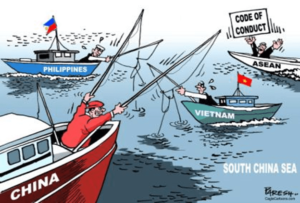
IN the spring or summer of 2021, Japan alarmingly announced that it would release around 1.3 million tons of contaminated water or wastewater from the destroyed Fukushima nuclear power plant into the sea. This contaminated water was a build-up at the wrecked Fukushima plant after treatment and dilution. These 1.3 million tons of wastewater can fill around 500 Olympic-sized swimming pools.
After two years, in a ministerial meeting in January of this year (2023), the Japanese government announced that it was pressing ahead with its unilateral decision to release the 1.3 million tons of radioactive wastewater from the deceased Fukushima Daiichi Nuclear Power Plant into the Pacific Ocean this spring or summer despite widespread opposition from Japanese local fisherfolk, marine scientists, and from countries and civil society organizations across the Asia-Pacific region.
Nuclear waste is produced from industrial, medical and scientific processes that use radioactive material. Nuclear waste can have harmful and damaging effects on marine ecosystems and habitats.
Opposition
Countries in East Asia like South Korea and China, and even Taiwan, are in opposition to Japan’s unilateral decision to dump nuclear-contaminated wastewater into the Pacific Ocean. Moreover, it’s not only the neighboring countries that have expressed their opposition and resistance to the plan of dumping wastewater into the sea. Even the Japanese people themselves are opposed to it.
In the Philippines, just recently, a group of intellectuals representing various socio-civic organizations and think tanks that are concerned and worried about the possible adverse impacts of dumping nuke wastewater into the Pacific Ocean held a media forum last March 18, 2023, with the theme, “Fukushima Nuke Wastewater Release: Crime Against Humanity.” In this forum, a “Global Declaration” concerning the issue was presented and expressed, which states:
“We, Citizens of the World, gathered here today in Manila, Philippines, on March 18, 2023, in unity and solidarity for the welfare of all Humanity and its future generations, denounce and protest the release of contaminated, radioactive nuclear wastewater from the Tepco Fukushima Daiichi Nuclear Power Plant. This release of contaminated wastewater must not be allowed to proceed lest the oceans of the world and the food chain be poisoned by radionuclides such as tritium, carbon-14, strontium-90, cobalt-60, iodine-129, ruthenium-106, and cesium-137 that harm all organic life.
“The volume of radioactive water increases daily, even now 12 years after the meltdowns, as the radioactive debris in the reactors must be continuously cooled. This release is planned to take at least 30 years. Yet, Tepco and the Japanese government have not adequately investigated alternatives such as storing the water securely or using presently existing technology to solidify it. Instead, they have decided to poison our oceans.
“Hence, the decision to dump contaminated water ignores human rights and International Maritime Law. People and nations of the world, from the most populous to the smallest Pacific Islands, are opposed to the release of this toxic wastewater into the oceans.
“We come together today to sign this joint statement which we shall bring to our counterparts in other nations to join and take common action.”
Hindsight
The Philippines, as a Pacific country, should be wary about the possible adverse impact of the planned dumping of 1.3 million tons of nuclear-contaminated wastewater into the Pacific Ocean by Japan, for if this plan pushes through, it will not only affect the marine ecosystem and resources surrounding the Philippines but to a greater extent will affect the fishing industry of the country and the health, welfare and well-being of Filipinos. Thus, it is imperative to ask if President Ferdinand R. Marcos Jr. will review the Japanese government’s decision and if he will further inquire on this issue by summoning the Japanese ambassador to the Philippines. This remains to be seen.
On the other hand, the unilateral plan of the Japanese government to discharge the Fukushima wastewater into the Pacific is akin to a disregard for Japan’s adherence and compliance with international law on the protection of the environment, which is a set of principles that aims to curb pollution and depletion of natural resources. Embodied in the basic principles of International Environmental Law is the idea that we are one ecosystem, that we are interconnected, and that the polluter must pay. Hence, all countries, including Japan, must comply with and respect these basic principles of International Environmental Law.
Conclusion
On this note, the unilateral plan of the Japanese government to dump wastewater in the Pacific Ocean needs to be reconsidered and studied further. Given the seriousness of the matter, Japan should at least show the necessary courtesy to consult and discuss its decision with its immediate neighbors like South Korea, China, Taiwan, and even beyond East Asia.
It should be noted that the bodies of water in Asia are very much connected, and pollutants originating from the Fukushima plant will no doubt reach nearby areas, affecting local marine and coastal environments and people’s health. Thus, as a responsible member of the community of nations, Japan should think twice before proceeding with its plan and prudently consult with countries directly affected by such a decision.
However, Japan, a privileged country, may not heed the call of its neighbors, probably because it has the backing of the US. But if something goes wrong with the plan, developing countries like the Philippines will undoubtedly be adversely affected and left on their own to suffer the negative consequences.
Hence, the Philippines and other Asia-Pacific countries should challenge and strongly condemn the decision of the Japanese government to release the Fukushima nuclear wastewater into the sea. There should be a united voice in this regard, for such action, if it pushes through, is damaging to the environment. Likewise, local and international media and even the mainstream media in the Philippines should not downplay the issue, for it is of great importance to the welfare and well-being of the marine environment and people’s health.
We need to remember that we are all dependent on our natural environment. When we destroy our environment, we all suffer. Hence, we should not forget that environmental problems and issues alike, including the planned dumping of Fukushima wastewater into the Pacific Ocean, threaten humanity and all species and certainly warrants serious and equal attention.
Source: The Manila Times
https://www.manilatimes.net/2023/03/23/opinion/columns/japans-dumping-of-fukushima-nuke-wastewater-should-be-opposed/1883935


